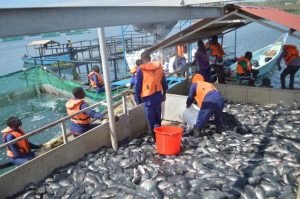Best Universities to Study Fisheries in Nigeria
A branch of agriculture known as “fishery” deals with the raising of fish and other aquatic creatures. Fish farming, on the other hand, is the artificial growing of fish until they are of table size in specially designed ponds and other enclosures; in coastal waterways, lagoons, and reservoirs.
The years of the study for a degree in fisheries varies depending on the level of entry and the candidates’ qualifications. B. Fishery has five years of SSC/WASC/ GCE ‘0’ level SSCE credit passes in any one of the following: Maths, English, Chemistry, Biology, or an Agricultural science.
In today’s article, we’ll be looking at the best universities to study fishery in Nigeria
Best Universities to Study Fisheries in Nigeria

Below are the best universities to study fishery in Nigeria
University of Lagos
The University of Lagos has the top fisheries and aquatic sciences program in Nigeria. Established in 1962, the department offers undergraduate and postgraduate degrees in fisheries, with opportunities for practical training and internships.
Unilag’s Department of Fisheries is staffed by highly qualified lecturers and professors with expertise in various sub-fields of fisheries science. Many are involved in groundbreaking research on sustainable aquaculture, fish feed formulation and inland fisheries management.
With its outstanding faculty, world-class facilities and focus on practical learning, it’s easy to see why Unilag remains the top choice for a fisheries education in Nigeria.
Federal University of Agriculture, Abeokuta
If you want an affordable university with a top fisheries program, look no further than the Federal University of Agriculture, Abeokuta (FUNAAB). Founded in 1988, FUNAAB is a leading agricultural university in Nigeria with a Fisheries and Aquaculture department that offers undergraduate and postgraduate degrees.
The B. Fisheries program at FUNAAB takes 4 years and covers all areas of fisheries including aquaculture, fish processing, and fisheries management. You’ll take courses in ichthyology, limnology, fish genetics, and fish nutrition. The curriculum focuses on both theoretical knowledge and practical skills with opportunities for hands-on learning.
FUNAAB should be at the top of your list if you want to study fisheries in Nigeria. A degree from here will prepare you for a successful career as a fisheries scientist, aquaculture manager, or consultant. So go ahead – take the plunge into the fisheries program at this prestigious university! You won’t regret it.
READ ALSO: Best Universities to Study Engineering Studies in Nigeria
River State University
River State University in Port Harcourt, Nigeria has a top fisheries and aquaculture program. If you want to focus on fish farming, RSU should be at the top of your list.
RSU’s Department of Fisheries and Aquaculture aims to produce graduates with theoretical and practical knowledge in sustainable aquaculture. The program covers fish nutrition, fish breeding and genetics, fish health management, and aquaculture systems and engineering.
RSU is an affordable, top choice for studying fisheries and aquaculture. Their hands-on aquaculture program and connections with industry will prepare you for a successful career in fish farming. If you want to contribute to Nigeria’s food security by improving fish production, RSU is the place to start.
University of Ibadan
The University of Ibadan is a premier university in Nigeria with strong programs in fisheries and marine sciences. Established in 1948, UI has a long history of excellence in education and research.
With its emphasis on research, location, and facilities, UI deserves its reputation as one of the top fisheries schools in Nigeria. If you’re looking to become an expert in the field, UI is an excellent place to launch your career.
Niger Delta University
Located in the heart of Nigeria’s Niger Delta region, Niger Delta University is situated in an area dominated by fishing and fisheries. This gives students exposure to real-world fisheries through interactions with local fish farmers and fishermen.
NDU has well-equipped laboratories for areas like fish biology, fish genetics, fish nutrition, and fish pathology. The university also has an earthen fish pond for practical lessons in fish farming. These resources provide students with opportunities to gain practical skills to complement their theoretical knowledge.
Conclusion
Studying fisheries in Nigeria will give you valuable experience and connections in this sector. You’ll also benefit from lower costs of living and tuition compared to other countries. Graduating from a Nigerian university demonstrates your ability to succeed in a challenging environment.
READ ALSO: Best Universities to Study Materials Engineering in Nigeria
FAQs
Once you’ve decided to study fisheries in Nigeria, you’ll likely have some questions. Below are a few of the most frequently asked questions and answers;
1. What programs are offered?
Most top fisheries schools in Nigeria offer bachelor’s, master’s, and PhD degrees in fisheries, aquaculture, marine biology, and environmental sciences. Some also have diploma and certificate programs.
2. What are the admission requirements?
To get into a fisheries program at a Nigerian university, you’ll need good grades, acceptable scores on entrance exams like JAMB, a completed application, and possibly an interview. For master’s and PhD programs, a bachelor’s degree in a related field is usually required. Some schools may ask for work experience, references, or a research proposal as well.
3. How much does it cost?
Tuition and fees can vary but often range from ₦150,000 to ₦500,000 per year for bachelor’s degrees at public schools in Nigeria.
4. What are the job opportunities?
Graduates of fisheries programs can find work as fish farmers, aquaculture technicians, fishery officers, fish breeders, aquatic environmentalists, fishing gear technologists, and more. According to recent estimates, the aquaculture and fisheries sector in Nigeria provides jobs for over 9 million people. With a degree in this field, you’ll have excellent career prospects.
5. Why study fisheries in Nigeria?
Nigeria has a fast-growing aquaculture and fisheries industry, as well as abundant natural resources like rivers, lakes, and coastal waters.









